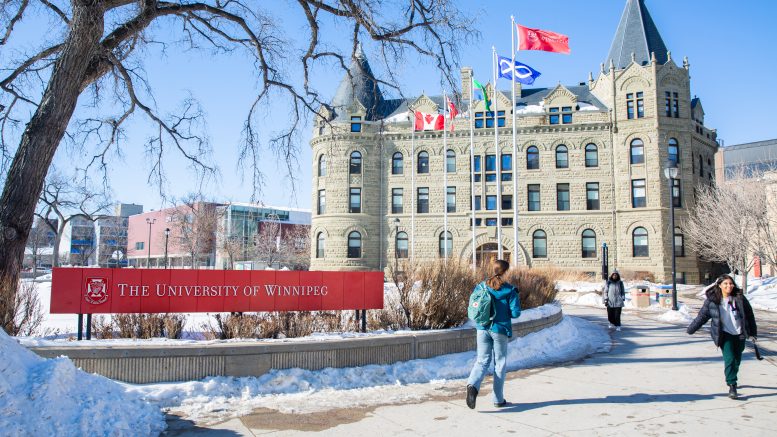The University of Winnipeg Faculty Association (UWFA) has sent a letter to the university’s board of regents, voicing concerns following an “inordinate number of resignations and other departures” from senior staff and administration, the letter reads.
Published in the Winnipeg Free Press the day after the board received it earlier this month, the letter pointed to multiple senior departures over the course of the past 18 months. Notable names listed included Chris Minaker, former associate vice-president engagement, Jennefer Nepinak, former associate vice-president Indigenous engagement and Jan Stewart, former associate vice-president academic, who joins the U of M as dean of the faculty of education on Aug. 1.
“UWFA council members cannot recall a time when so many senior administrators left in the middle of appointments, often with little or no notice,” the letter read.
It expressed concern with “the current state of governance and administrative instability.”
The letter asked the board to take a further look at the issue, and among other questions, ask, “Why have so many administrators and staff members left in the past 18 months?”
It pointed to the rarity of UWFA writing a letter to the board, but that now the association holds “deep concern” with the trend, along with the impact it may have on the ability of the university to operate now and in the future.
While the letter directly brings up the association’s concern over resignations that occurred over the course of the past year and a half, which go back to January 2022, all the names put forward in the letter are of those who resigned following the appointment of Todd Mondor as president and vice-chancellor in April 2022.
Mondor expressed his disappointment with the implication that he and his leadership style were responsible for the resignations. He said that he had not worked with half of the people listed in letter, and had not even met some.
Regardless, “every person on that list I was sorry to see go,” he said.
Mondor said he believes things have not changed much at the university since he began his term, and that his approach, one of collaboration, has been the same at the U of W as it was during his time at the U of M. At that institution, he acted in several academic and administrative roles over the course of more than two decades, including deputy provost academic planning
and programs.
He also said that there have not been any complaints about his behaviour, neither at the U of W nor at the U of M.
In the case of each departure, Mondor said that the staff had found jobs elsewhere, whether it be for promotions, higher pay or other considerations. In the meantime, some were hired to fill acting positions until someone was permanently brought on.
One former staff member mentioned in the letter, Julia Ryckman, left the U of W in June 2023. She said she left her position at the university because she was offered her “dream job.”
“I loved my time at UWinnipeg and I still stay in touch with my former colleagues,” she said in an email.
UWFA president Peter Miller declined a request for comment. In a meeting with Mondor and the university’s vice president academic Pavlina Radia following the board of regents’ receipt of the letter, UWFA was asked not to give any comment to the media until the board had the chance to meet, but as the letter states, it was sent “with concern for the health of our
institution.”
Chair of the board of regents Stefan Jonasson said it is too premature for the entire board to meet to discuss the issue. However, the board officers have met, and they were surprised by the letter. “Of course [we] would want to give the faculty association the opportunity to communicate with us,” he said.
According to Jonasson, the staff turnover actually took place over the course of three years, not 18 months. The administration has spent this past year filling the vacancies that opened during the pandemic.
He said the board is currently gathering information, but so far, “the information has more or less confirmed our sense that the departures have been just departures in the normal course of events, and that there are sound explanations for each departure.”
Staff turnover is natural for an organization, Jonasson said. The board sees the amount of change that the U of W has experienced as no different from what an organization would reasonably see.
Miller told the Free Press that he “would have hoped that the board would take this opportunity to reflect on [our concerns] and investigate.” He noted that a place to start might be to examine the number of turnovers during previous administrative changes.
Jino Distasio, vice-president research and innovation and professor of geography at the U of W, has been at the university for 24 years, and in administrative positions for about 15 years.
The interesting part of the U of W, he said, is its smaller size, and because of that, “there’s just always been a real strong connection among different people on campus,” Distasio said.
Since Mondor’s appointment, Distasio said that this internal culture has not changed more than it has with any other president he has worked with over the past 24 years. With every new president, the administration and governance structures differ.
Mondor’s appointment is different from others because of the pandemic, and for that reason, may have resulted in a bit more of a turnover. Distasio does not think that the turnover can be attributed to the change in governance, though, because the number of acting positions over the past two or three years were in place prior to Mondor’s arrival.
Distasio emphasized that the focus should not solely be on the fact that people left, but that “some really great people arrived,” and said that was missing from the association’s letter.



